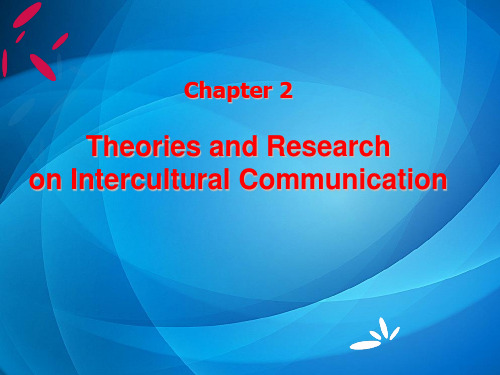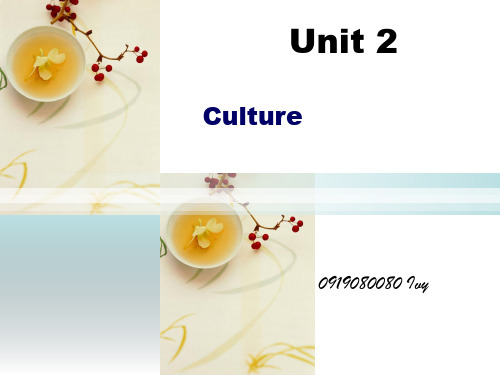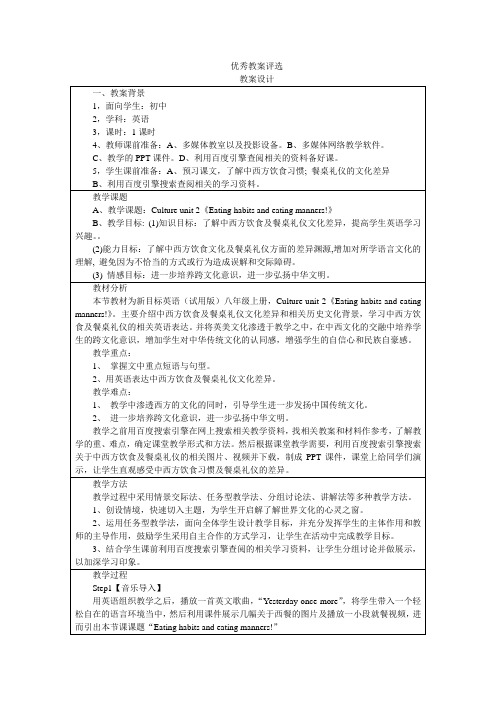Culture 2
- 格式:ppt
- 大小:8.45 MB
- 文档页数:22






优秀教案评选【板书】Eating habits and eating manners!【百度文库】/search?word=%D3%A2%C3%C0%C8%CB%D3%C3%B2%CD%C 6%F7%BE%DF%CD%BC%C6%AC&lm=0&od=0【百度搜索】/s?bs=%CE%F7%B2%CD%CD%BC%C6%AC&f=8&wd=%C8%C8%B9 %B7%CD%BC%C6%AC【百度视频】/v?ct=301989888&rn=20&pn=0&db=0&s=19&rsp=8&word=%D3% C3%B2%CD%C0%F1%D2%C7%CA%D3%C6%B5&fbl=1024Step2【讲授新课】1、西餐简介2、中西方饮食习惯3、餐桌礼仪【百度搜索】西餐简介/s?wd=%CE%F7%B2%CD%BC%F2%BD%E9【百度搜索】中西方饮食习惯/s?wd=%D6%D0%CE%F7%B7%BD%D2%FB%CA%B3%CF%B0% B9%DF【百度搜索】餐桌礼仪/s?wd=%B2%CD%D7%C0%C0%F1%D2%C7Step3【师生活动】【学生活动】学生根据教师要求,领受教学任务。
阅读课文在合作中完成既定目标。
【教师活动】教师时刻关注学生的活动状态,师生共同解决可能存在的问题和困惑,教师还可以补充以下问题(课件展示):How many western eating habits do you know?Do you like western fast food?Can you tell me some Chinese fast food?上述四个问题使学生更好的了解课文内容,并利用所学的知识和信息来进行自主对话,这样既锻炼了口语又巩固了课文内容。
【板书】fast food(KFC) eating habitsStep4【文章讲解】1.KFC相关知识。
Culture Unit 2 Festival: Thanksgiving教学设计方案一、概述Thanksgiving是英语人教课标版七年级下册Culture Unit 2 Festivals的内容。
本课题属主题探究活动课类,主题为Festival-Thanksgiving,主要是分别对中国的传统节日和西方的传统节日进行介绍,重点介绍感恩节的文化知识、感恩节的来源、感恩节的故事、人们传统的庆祝活动以及感恩节的风俗习惯。
本课的学习主要采用Web quest的方式进行。
本课需用2课时,80分钟,学生课后活动时间为1周。
二、教学目标分析∙∙1. 了解中西方节日文化知识;能够流畅地介绍万圣节的由来及其传统活动和风俗习惯;∙∙2. 能够上网查阅相关资料,搜集相关节日信息,制成演示文稿或电子贺卡;∙∙3. 能够就研究和探讨节日的庆祝活动展开讨论并进行活动模拟,体验节日的文化差异;∙∙4. 能够了解了中西方文化的差异,尊重各国民族风俗习惯,发展国际友谊。
三、学习者特征分析∙∙1. 学生初步掌握了电脑操作技巧,具有上网自主搜集相关资料、筛选信息并对信息进行整理和重组的能力;∙∙2. 学生对"Festival"话题比较感兴趣,尤其西方的感恩节、万圣节等一些了解不多的节日更是兴趣盎然;文化知识学生了解的不多,而现在随着西方节日逐渐在中国流行,学生对西方文化的了解也越来越有兴趣,也就激发学生去探究活动的强烈动机。
∙∙3. 学生已有过学习、体会合作学习的经历,具有良好的合作意识和团队精神。
四、教学策略选择与设计∙∙1. 抛锚策略:由歌曲把学生带入节日的氛围,设任务,引导学生阅读有关中西方节日知识,使学生对中西方节日文化有个总体了解,产生兴趣,激发后面感恩节自主活动的动机;∙∙2. 自主学习策略:学生通过网络上网,自主查阅相关资料,筛选信息,并对信息进行整理和重组,培养学生搜集信息的能力;∙∙3. 师生互动,小组讨论和演示活动,充分锻炼学生的自主活动的能力。
Unit-2-Culture课文翻译大学体验英语四Unit 2 CulturePassage A Why Digital Culture Is Good for You?The news media, along with social and behavioral scientists, have recently sent out a multitude of warnings about the many dangers that await us out there in cyberspace. The truth of the matter is that the Web is no more inherently dangerous than anything else in the world. It is not some amorphous entity capable of inflicting harmful outcomes on all who enter. In fact, in and of itself, the Web is fairly harmless. It has no special power to overtake its users and alter their very existence. Like the old tale that the vampire cannot harm you unless you invite it to cross your threshold, the Internet cannot corrupt without being invited. And, with the exception of children and the weak-willed, it cannot create what does not already exist...(1) Like alcohol, the Web simply magnifies what is already there: Experts are concerned that the masking that goes on online poses a danger for everyone who is a part of the Digital Culture. Before we know it, the experts tell us, we will all use fake identities, become fragmented, and will no longer be sure of just who we are. Wrong. The only people who feel compelled to mask, and otherwise misrepresent themselves online are the same people who are mysterious and unfrank in "real life"...the Net just gives them one more tool to practice their deceit.As for the rest of us, getting taken in by these people is a low probability. We know who these folks are in the "real world". The Internet does not "cause" people to disguise as something they are not. As for the Digital Culture getting cheated by these dishonest folks, well,there are just as many "cues" online to decipher deception as there are in the "real world". The competent WebHead can recognize many red flags given off by the online behavior of others. Oftentimes the intentions of fellow users is crystal clear, especially over time.When someone is trying to deceive us online, inconsistencies, the essence that they are trying "too hard" or are just plain unbelievable, often come through loud and clear. Likewise, just like in the "real world", a host of other unacceptable tendencies can be readily recognized online. Narcissism (it's all about "meeeee"), those people who have nothing but negativity or unpleasant things to say about others, and those who feel compelled to undermine others and who think they must blow out the other guys' candles in order for theirown to shine can be spotted a cybermile away.(2) The Web can bring out the best in people: Gregarious, frank folks in "real life" usually carry these same traits over to their online life. Most are just as fun-loving online if not more so, as they are at a party, at work, or at the local bar. Though admittedly, some are not quite as much fun to be around without a stiff drink.Shy folks have a "safer" environment online than in the "real world" and can learn to express themselves more freely on the Net (you've never seen anyone stutter on e-mail, have you?) allowing them to gain confidence and communication skills that can eventually spill over into other aspects of their lives. Helpful people in "real life" are often just as willing to come to someone's assistance online asanywhere else.(3) People are judged differently on the Web: On the Internet people are judged by their personality, beliefs and online actions, NOT by their physical appearance. This is good. It not only gives ugly folks an aid, but causes Beautiful People to have to say something worth listening to in order to get attention.(4) People open up more: Many people are opening up a whole lot more these days since they are not required to use their real name and provide their real identity in the Internet.(5) We're connected: Members of the Digital Culture know full well that there is a wealth of important information and life-changing opportunities out there in cyberspace. The Web has opened doors for many of us that otherwise would never havebeen an option. Research possibilities and networking are just two such opportunities.(6) We Learn the Power of Words and to be Better Listeners: With no facial expressions, body language, or physical appearance to distract us, members of the Digital Culture have learned the power of words ... both their own, and others'. We know very well how a simple string of words can harm, hurt and offend, or how they can offer humor, help, support and encouragement. Most experienced members of the online culture have learned to become wordsmiths, carefully crafting the words they use to convey exactly what they mean so as not to be misunderstood.Many of us have also learned to become far better listeners thanks to the Internet. Not only do we choose ourwords more carefully but we (especially those who communicate via email as opposed to chat rooms) are forced to wait until the other person finishes before we can speak or respond.A为什么数字文化对你有好处?最近,新闻媒体以及社会学家和行为学家们都发出大量警告指出:网络空间危险重重。